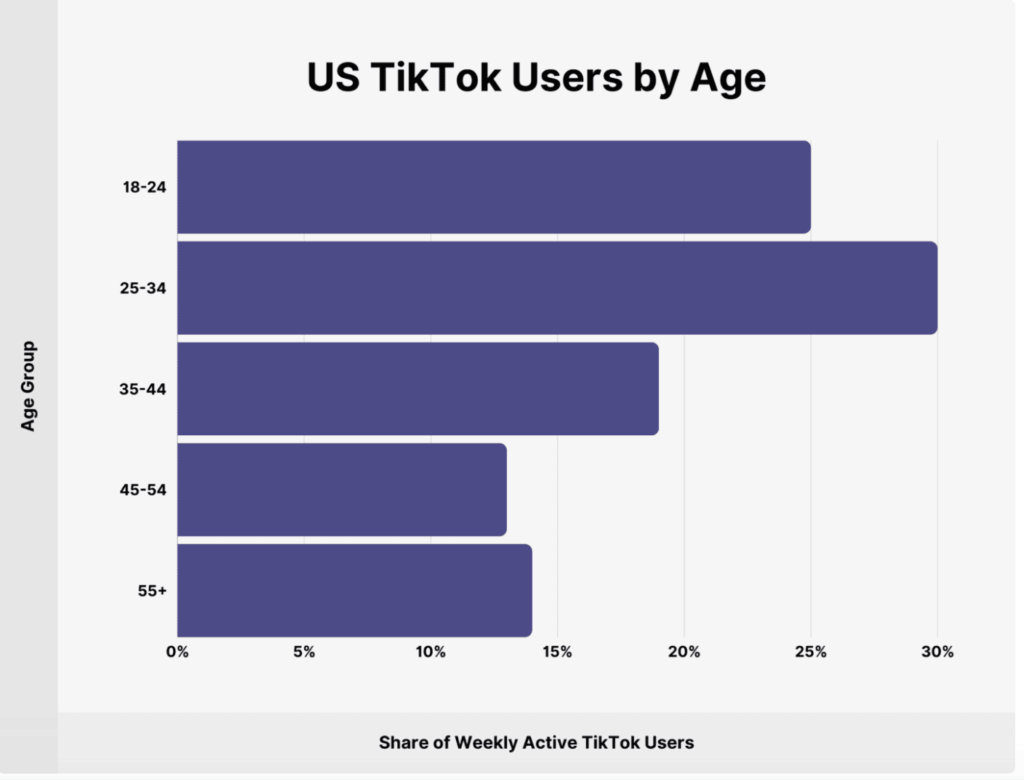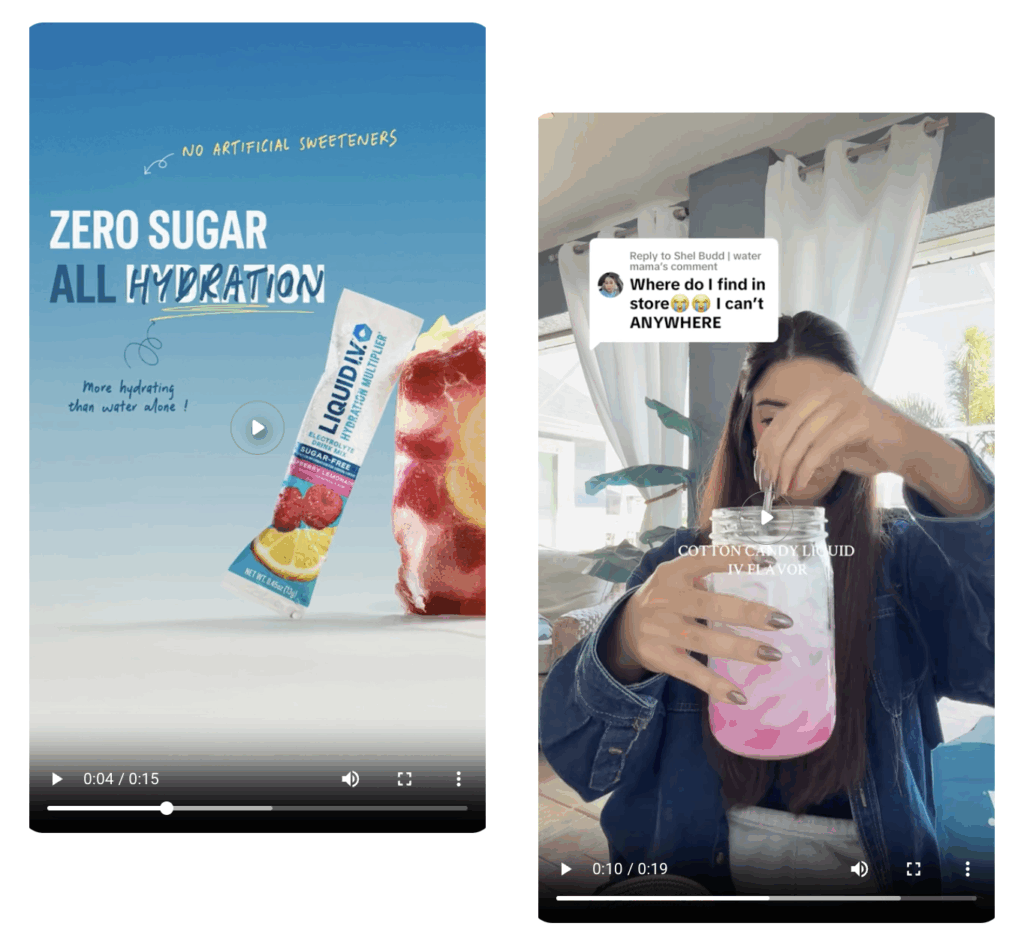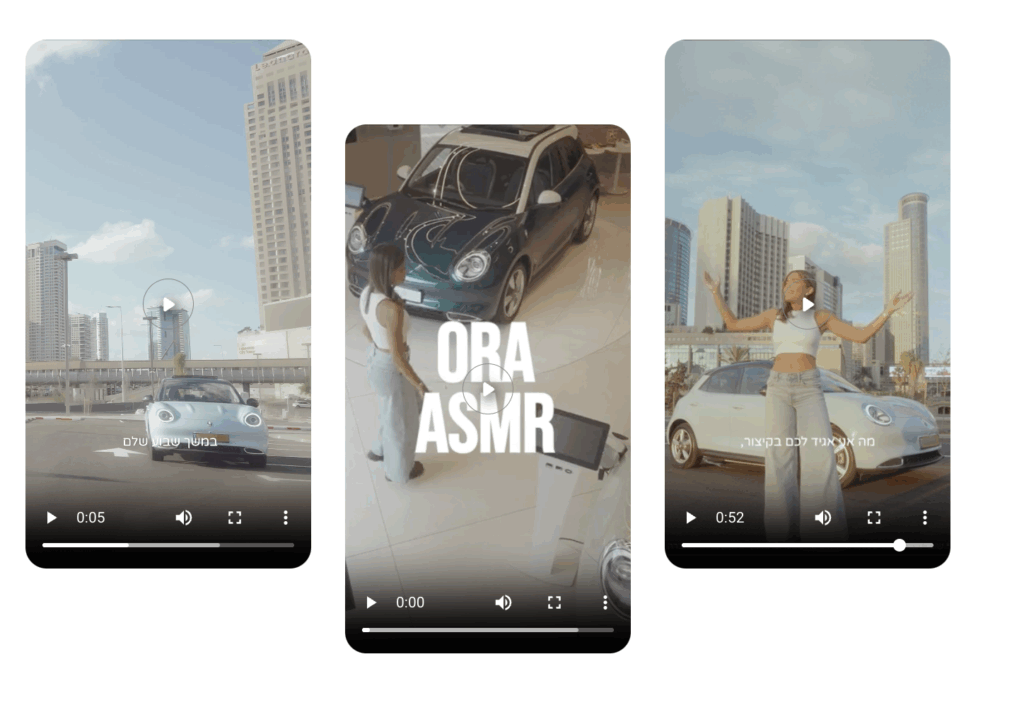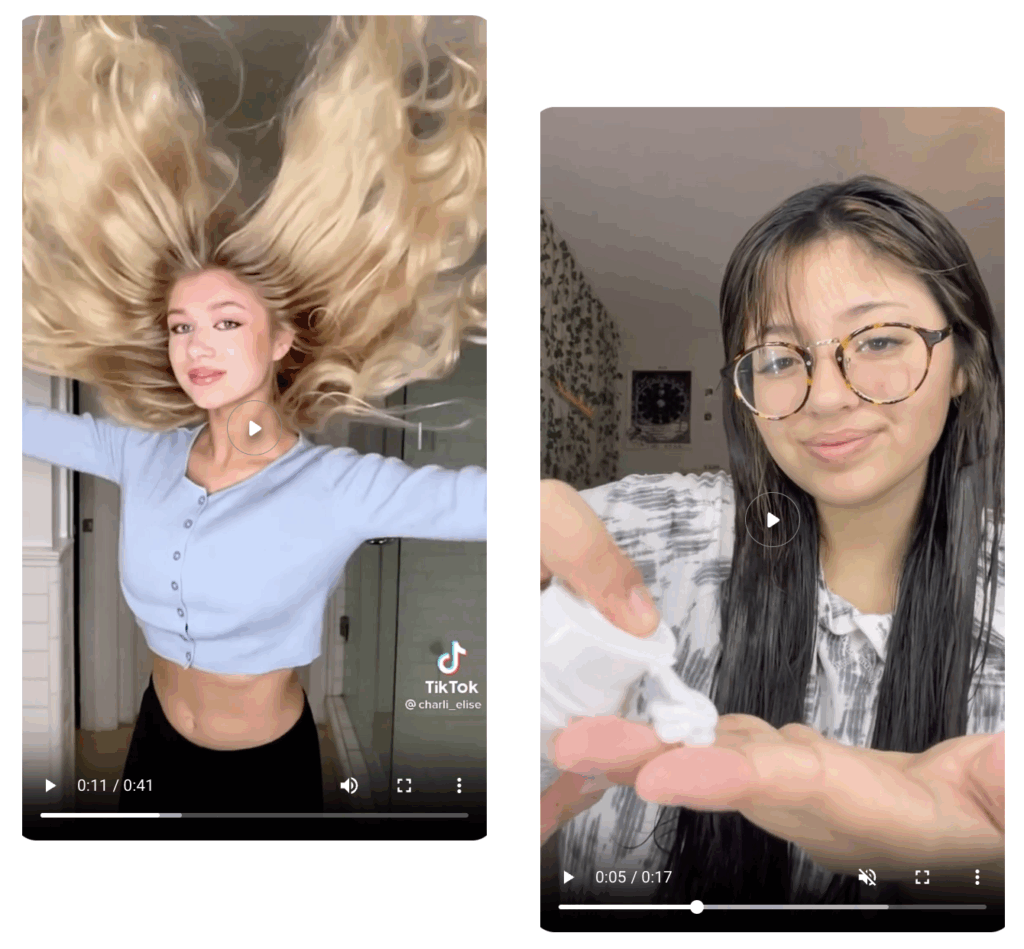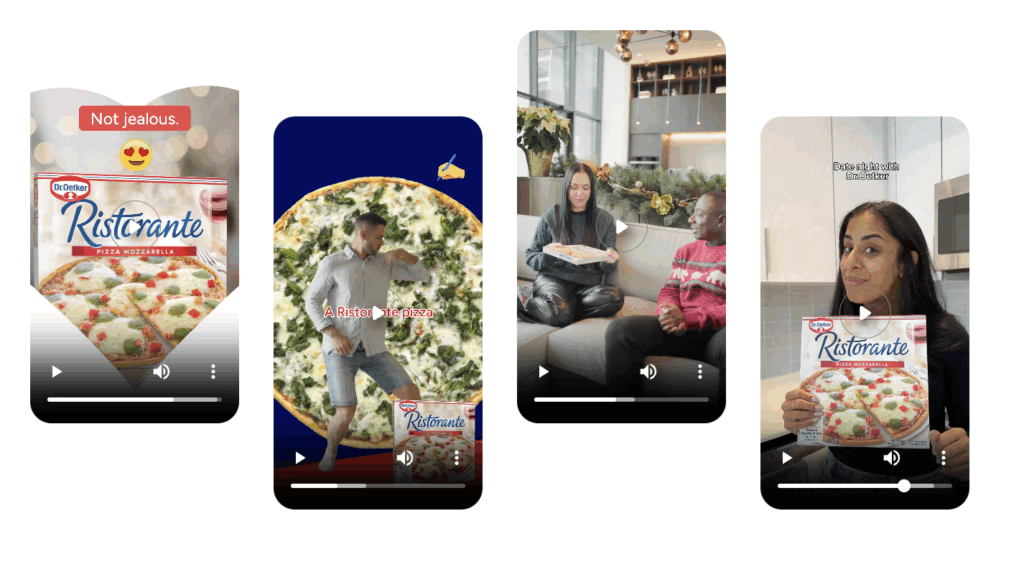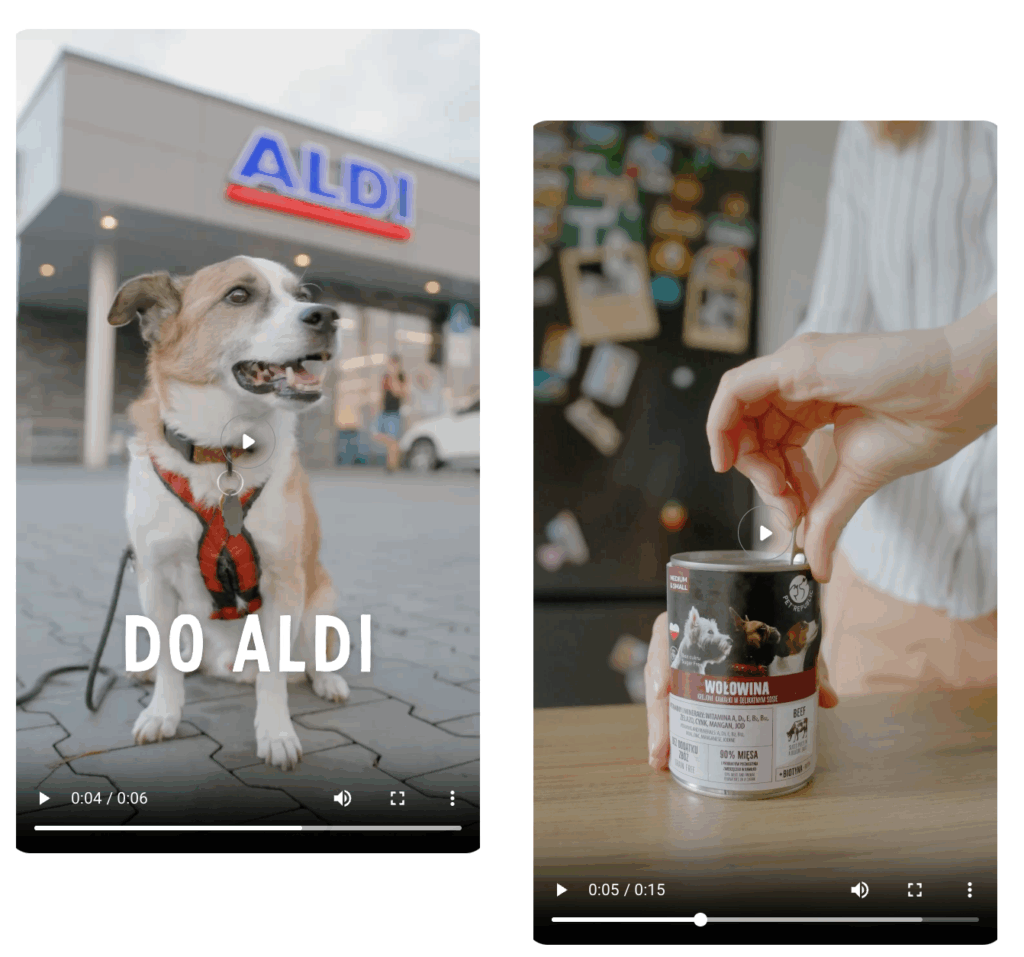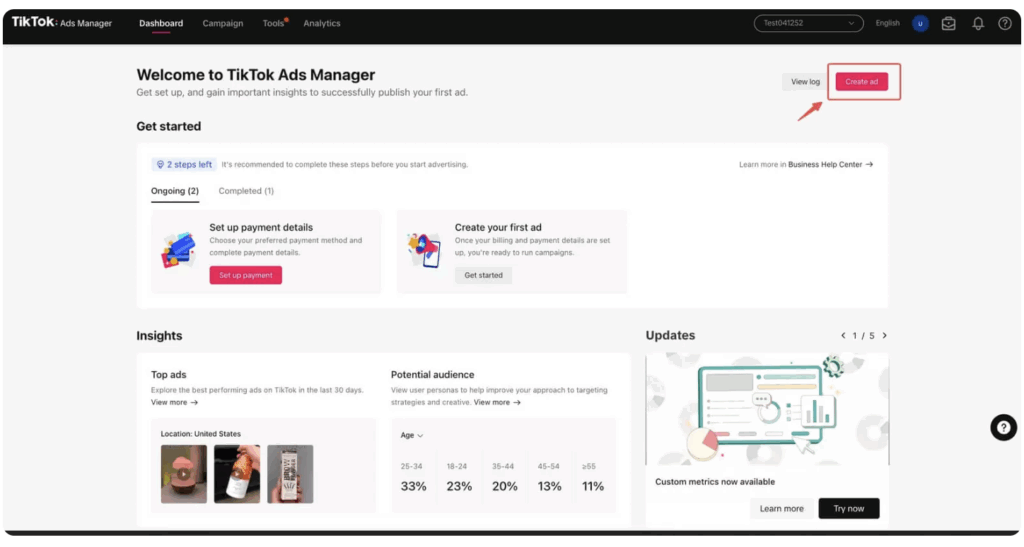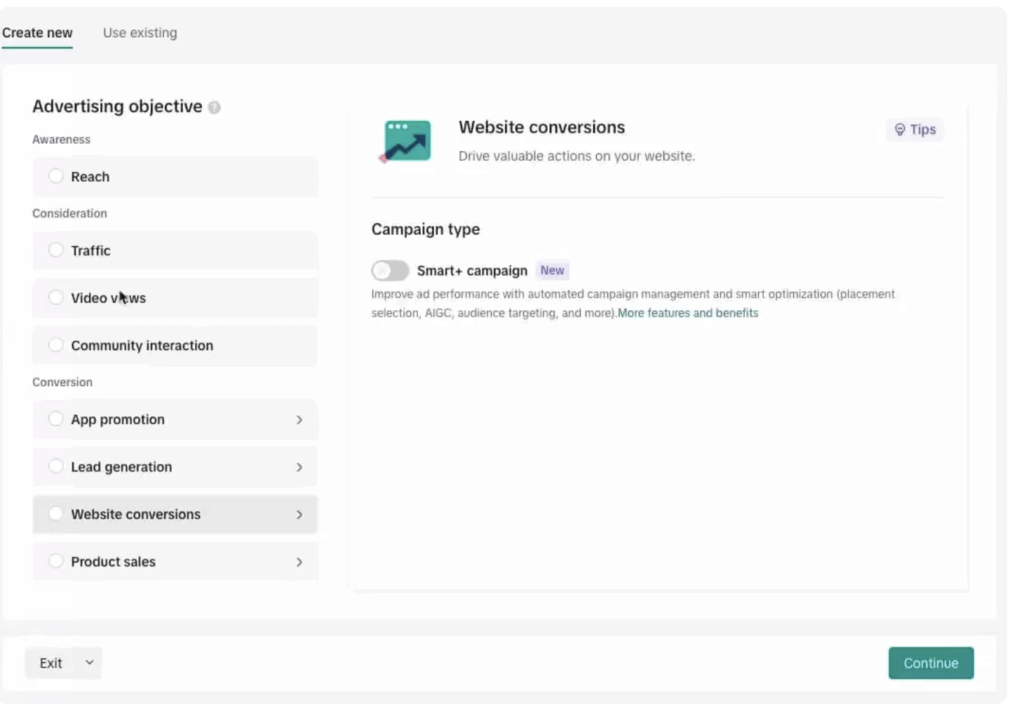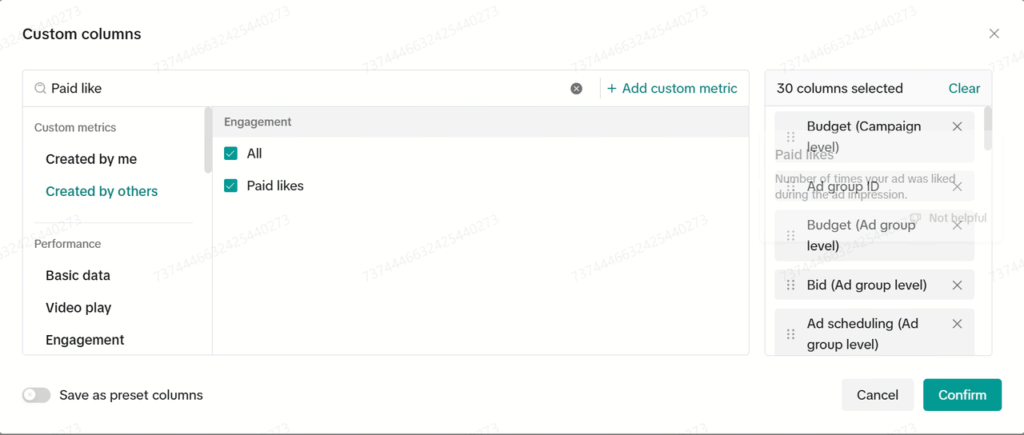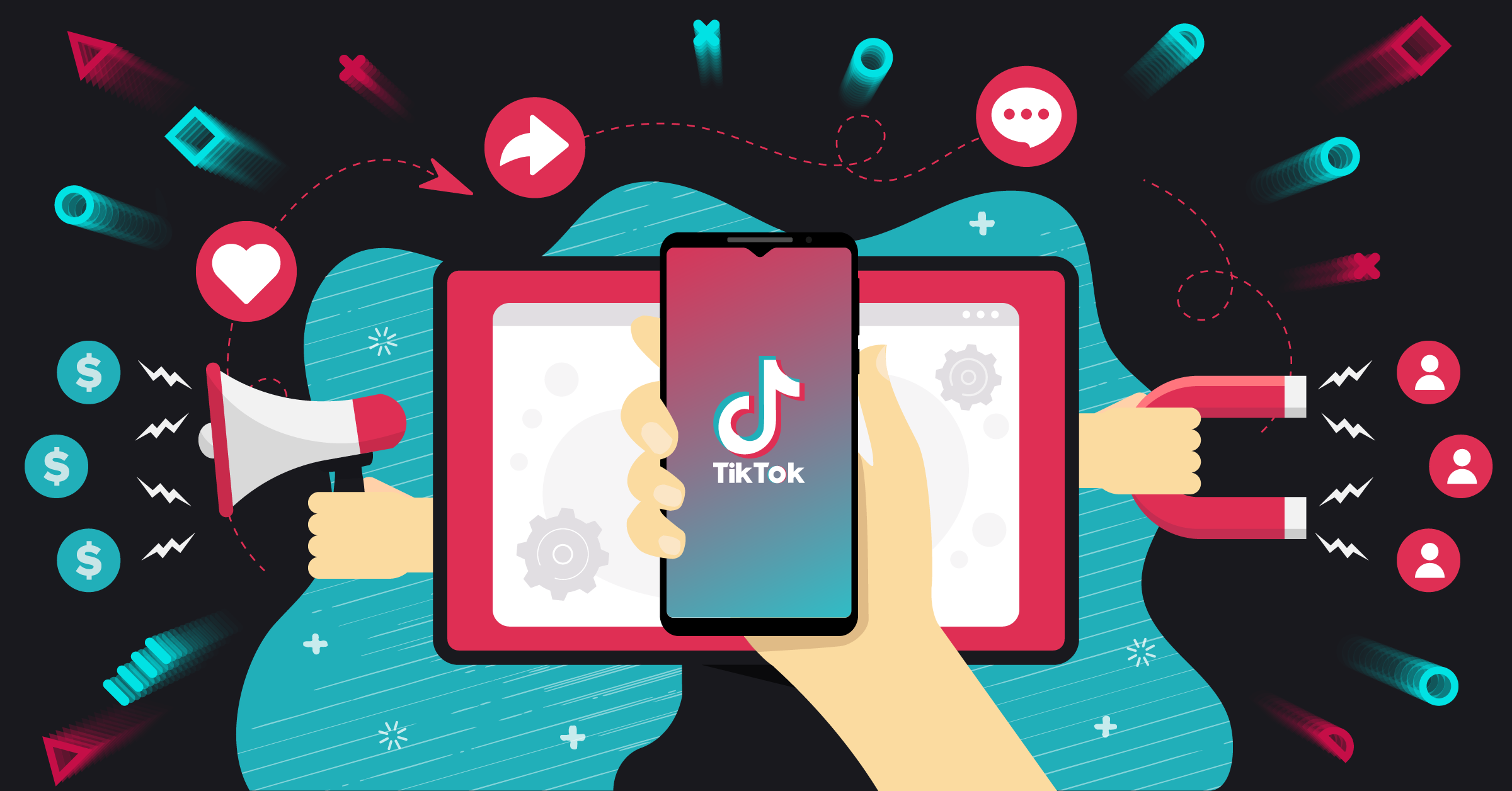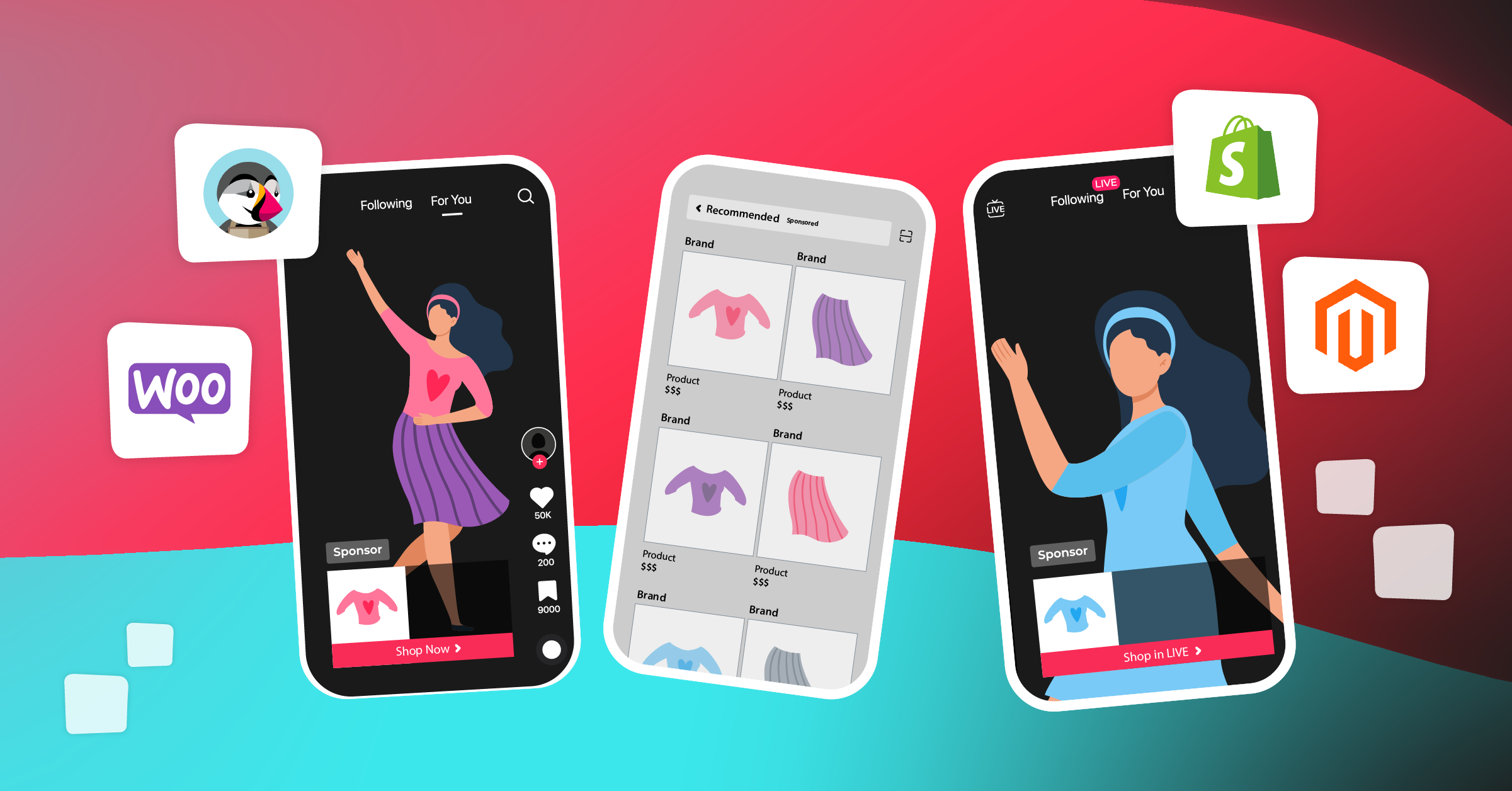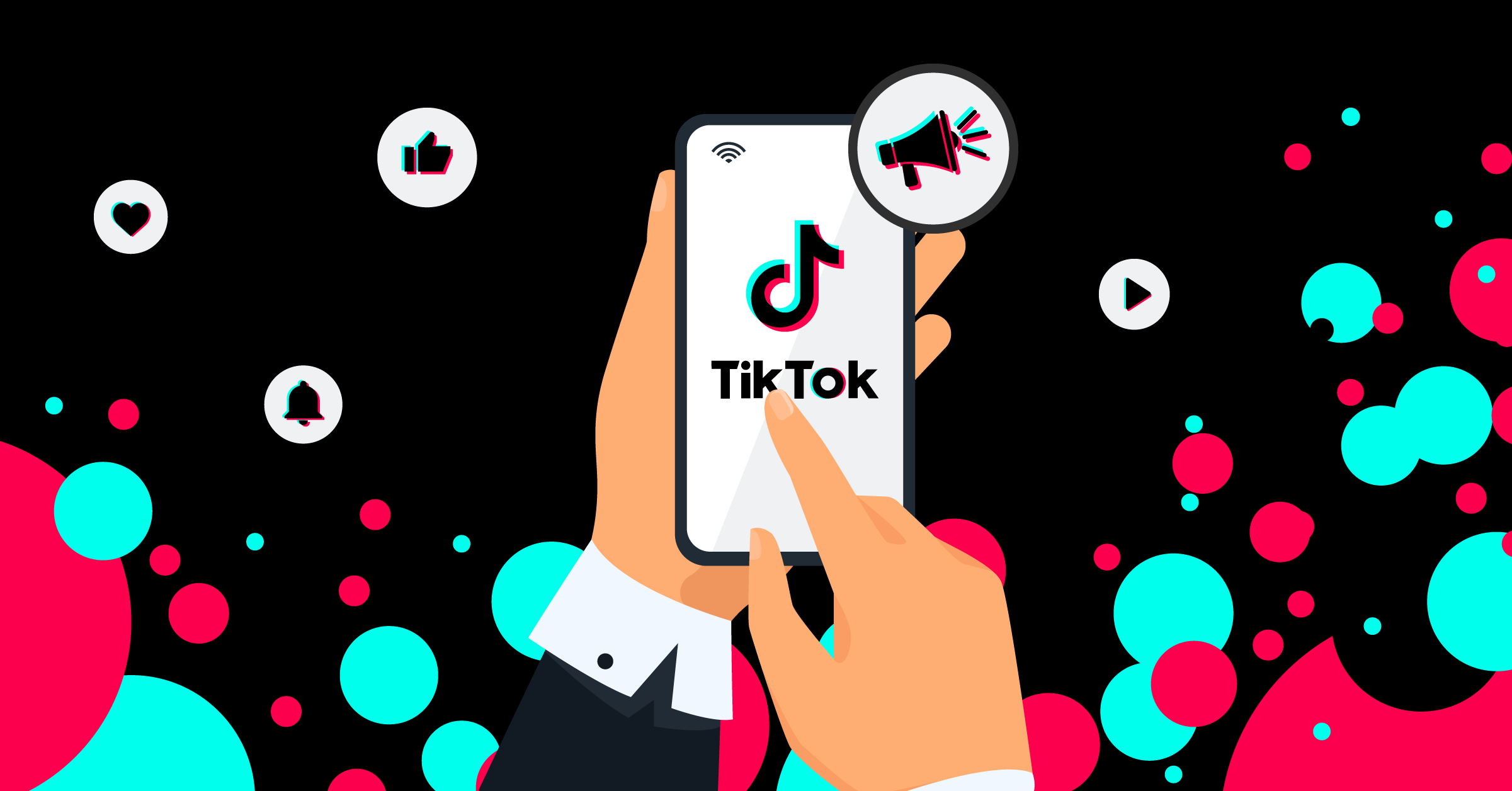
TikTok is a video-sharing social networking service that enables users to make short videos, usually fifteen seconds long, in different genres, such as dance and comedy.
It’s the sixth-largest social media network worldwide. Whether you want to sell more of your products or services or drive targeted traffic to your website, TikTok advertising campaigns can give you good returns on your ad spend.
TikTok launched its lead generation tool to help businesses generate more leads. Wondering how to run ads on TikTok?
- Who uses TikTok?
- Does TikTok have ads?
- Are TikTok ads for all businesses?
- Why TikTok advertising?
- How effective is TikTok advertising?
- Should you create a TikTok Ads Account?
- Types of TikTok ads
- The difference between TikTok’s ad placements
- How to run ads on TikTok
- Selecting TikTok’s objectives for your campaign
- TikTok ad targeting
- How to optimize TikTok ads
- TikTok ad policy
- TikTok ads best practices
- Creative Tips at TikTok Ads Creative Center
- TikTok Lead Generation
- TikTok advertising cost
- TikTok advertising revenue
- How to get ad revenue on TikTok
- How to track TikTok campaigns
- TikTok Advertising examples
- TikTok ads vs. Facebook ads
- TikTok ads vs. Instagram ads
- TikTok ads vs. Google ads
- TikTok ads vs. YouTube ads
- Snapchat ads vs. TikTok ads
- TikTok vs. Pinterest ads
- Takeaways
We have put together this complete guide to show you how to create ads on TikTok, make the most out of it, and boost your ROIs.
In addition, we’ll talk about some of our popular TikTok integrations that you can try for free.
Who uses TikTok?
TikTok is a popular app available in 154 countries and has over 1 billion active users worldwide, including both males (55.7%) and females (44.3%).
TikTok’s rapid growth and continued popularity suggest that TikTok is likely to remain a significant cultural force in the coming years. To make your videos stand out and have a greater impact, you can use various applications, such as Videoleap video editor.
TikTok is also the most downloaded social app worldwide, with users spending a daily average of 58 minutes on this platform.
All this information about TikTok users makes it an ideal focal point for marketers. But do all businesses benefit from advertising on TikTok?
Does TikTok have ads?
TikTok has various ads for businesses to reach their target audience, including In-Feed ads, Brand takeover ads, Top view ads, Branded Hashtag ads, Spark ads, and Branded effect ads.
When creating campaigns and ad groups on this platform, you have the option to set budgets for both. According to TikTok, a campaign can have several ad groups, and there are two types of budgets available: lifetime and daily.
Are TikTok ads for all businesses?
TikTok is suitable for most businesses but not all. TikTok advertising is ideal for companies looking for large and engaged audiences. If you are targeting young audiences, you should be running ad campaigns on TikTok now. Learn more about how to use TikTok for Small Businesses.
Why TikTok advertising?
1. TikTok is dominated by the Generation Z audience
Most of the TikTok audience is the Generation Z audience. This generation is expected to add nearly $9 trillion in global spending by 2034, surpassing any other generation.
This significant demographic shift will impact how companies will need to adapt their marketing and sales strategies to effectively reach and engage this generation.
2. TikTok’s user engagement rate is high
TikTok has an impressive average engagement rate of 2.5%. Trailing behind, Instagram nabbed second place, but with a significantly lower average engagement rate of just 0.50%.
3. TikTok advertising expands the reach of your video content
Video marketing is on the rise, and it will not slow down anytime soon. This is while TikTok and its users are completely video-centered. Also, a study revealed that viewers claim they retain 95% of a message when it is obtained via video.
4. TikTok has different ad formats that encourage engagement
The platform offers different TikTok ad formats, such as In-Feed ads, TopView ads, brand takeover ads, and branded hashtag challenges. These ad formats facilitate better engagement among users. For instance, In-Feed ads enable users to like, comment, share, follow, and shoot videos within the same TikTok sound.
5. TikTok advertising can help reach an international audience
TikTok is available in 154 countries with 75 different languages. If your business operates internationally, TikTok advertising enables you to reach an audience in different international markets.
How effective is TikTok advertising?
Are TikTok ads truly effective? Simply put, yes. Let’s look at some numbers:
- 92% of TikTok users are inspired to take action upon viewing a video;
- 37% have made purchases based on their discoveries on the platform.
A few years ago, TikTok commissioned four separate Nielsen Media Mix Model Meta Analyses. This experiment revealed that TikTok has a remarkable impact on return on ad spend (ROAS) and sales efficiency in the CPG vertical, for example.
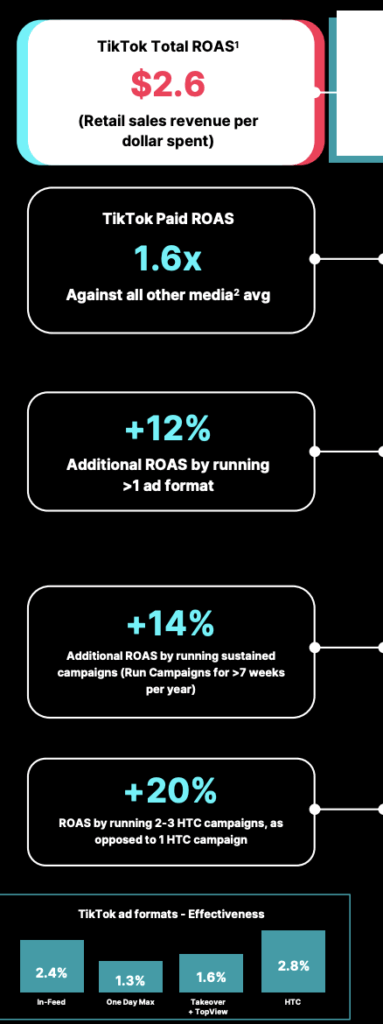
According to these studies, Europe witnessed a staggering 64% higher paid media ROAS compared to all digital media analyzed in the models, along with almost tripled offline sales efficiency. Notably, other regions like the Middle East, US, and Southeast Asia saw similar increases.
According to Kantar LinkAI analysis, over 3,500 measured TikTok ads outperformed their own digital and TV benchmarks by 15-20% across various metrics.
These metrics include Persuasion (how likely an ad influences brand predisposition), Brand Relevance (the value of communication points), and Enjoyment (the ad’s resonance and application). When viewers enjoy the ads, they become even more effective.
Should you create a TikTok Ads Account?
Every marketing effort on social media comes down to a simple conclusion: Gaining a follower fan base and brand exposure. These people eventually trust your brand as a go-to place to purchase the products you are offering.
You might have to spend months reaching a sufficient number of followers and gaining convertible traffic. Investing in a TikTok Ads Account gives you access to a large number of followers, reducing the time required and increasing your marketing efficiency.
“A properly implemented TikTok marketing and advertising strategy can bring in plenty of value to most businesses, almost irrespective of their industry.” Justas Palekas, Head of Product at IPRoyal, a leading residential proxy provider
A less-obvious tip is to use a VPN when running ads on TikTok. You can bypass geo-restrictions, allowing you to target specific audiences and expand your reach globally.
Let’s go through the top advantages of investing in a TikTok Ads Account:
- Easier to get followers: growing a fan base takes time which cuts off your marketing dollars in the long run.
- Higher engagement: Creating marketing campaigns that are highly optimized leads to higher engagement rates, such as more likes, comments, and shares. And more engagement means higher brand awareness and conversions.
Types of TikTok ads
There are seven different TikTok ad formats for businesses to use, including:
1. TikTok In-Feed ads
TikTok In-feed ads are the video ads displayed inside the native news feed as users scroll through the “For You Page”. They blend well with the TikTok feed. This makes it easy for users to quickly scroll past them. With In-feed ads, users can like, comment, share, and interact with the TikTok advertising videos.
Here is a good example of a TikTok In-feed ad video.
2. TikTok Brand Takeover ads
TikTok Brand Takeover ads pop up as soon as users open the TikTok app, take over the screen for a few seconds, and then change into an In-feed video ad.
They also appear on the “For You Page” as still images, videos, or gifs with clickable links that lead to landing pages within TikTok. You can also create and add your custom logos to stay top of mind and make viewers remember your brand.
A great example of a Brand Takeover ad is from Ora, achieving outstanding results such as 713% CTR.
3. TikTok TopView ads
TikTok TopView ads are similar to brand takeovers and aim to increase brand exposure. The difference is that TopView ads do not cover the screen as soon as users sign in.
Instead, they occupy the first In-Feed post after 3 seconds. After that, it shows up to 60 seconds of full-screen video with auto-play and sound.
Below is an example of a TikTok TopView ad from Cibertec, which has garnered over 450,000 clicks.
4. TikTok Branded Hashtag ads
The branded hashtag is about encouraging users to record themselves performing something like a dance or doing something in line with the product and posting it with a defined hashtag. These ads appear at the top of the discovery page.
When users click on the hashtags, it leads them to the landing pages on TikTok and a collection of other videos from the same hashtag challenge. TikTok hashtag challenges boost engagement and brand awareness.
Below is an example of TikTok’s branded hashtag ad from K18 Hair.
They started the #K18HairFlip challenge. Participants in the TikTok challenge stood to win a $1,000 Sephora gift card and a K18 salon service.
5. TikTok Branded effects ads
TikTok branded effects allow businesses to design an ad with their own custom filter on the app. The ad can last up to 10 days at a time and is a great way to increase user engagement.
A good example of TikTok branded effect ads is from Ristorante Pizza.
Colgate created a hashtag challenge #Colgatekiss, to produce an aesthetic for the brand in Thailand. They used a clickable branded effect with a ‘kissy face’ to complement the challenge.
6. TikTok Collection ads
This ad format allows users to find, discover, and browse products on their mobile devices in full-screen mode. When Collection Ads are published, you get to create an ad that will lead to an Instant Gallery Page.
TikTok Collection Ads offer a faster, more engaging ad experience that encourages consumers to take immediate action.

Here’s an example by beauty brand E.L.F., which has made good use of TikTok Collection Ads. With the full screen, their products are at center stage, making it harder for cosmetic lovers to pass them up.
7. TikTok Spark ads
TikTok Spark ads are a native ad format that lets advertisers tap into the power of authenticity by supercharging organic content.
This ad format offers the same amazing user interactions as organic videos: users can comment, like, and share. They can also visit your brand’s profile by swiping left or clicking the handle name or profile picture.
With TikTok Spark ads, brands can grow by building genuine connections with their community and delivering top-notch, native content that is authentic. This is made possible thanks to Spark Ads’ unique combination of the reach and impact of TopView and In-Feed Ads.
The difference between TikTok’s ad placements
TikTok placements of the ads are options that enable businesses to reach their target audience effectively. These placements vary in terms of where the ads will appear on the app and how users will interact with them. The main TikTok ad placements include:
- Spark ads: Boosted organic posts from real TikTok accounts, preserving all engagement (likes, comments, shares) as part of your brand’s social proof.ment and format.
- In-Feed ads: Skippable videos (up to 60 sec) shown in the “For You” feed. Users can like, share, or comment.
- TopView ads: Non-skippable, full-screen ads that appear when the app is opened, ideal for visibility and awareness.
- Brand Takeover ads: Interactive full-screen ads shown on app launch, available to one brand per day, with clickable elements (e.g., app download, website).
- Branded Hashtag Challenges: UGC-driven campaigns inviting users to create content around a branded hashtag, often with music and effects.
- Branded effects: Custom AR filters or stickers featuring brand elements, designed for user interaction and viral exposure.
Collection ads: In-Feed ads linked to an instant in-app storefront, enabling users to browse and shop without leaving TikTok.
How to run ads on TikTok
So how to run ads on TikTok? It is easier than you think. TikTok advertising platform, just like the Instagram Ad Manager, automates the ad creation process, which includes creating, delivering, and optimizing the ads. The first step is to install the TikTok pixel on your website.
How to set up a TikTok Ads Account
To advertise on TikTok, you have to create a TikTok Ads Account first.
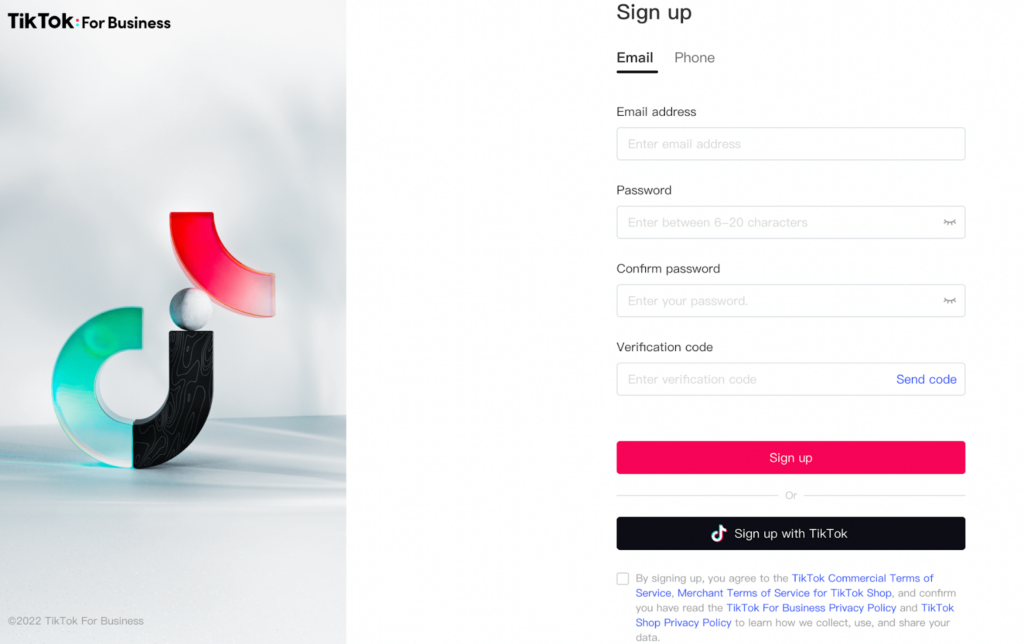
- Add your email address, where you’ll receive a verification code.
- Click Sign up.
- On this new page, fill in the required information, like brand name, industry, country, etc.
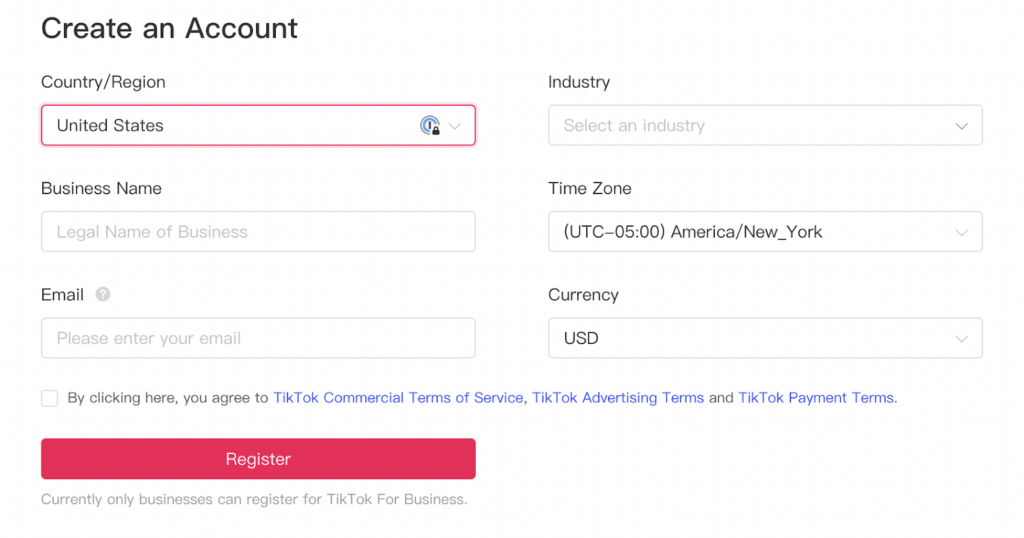
- Then click Register.
If you own a regular TikTok account already, use that account instead to sign up for the TikTok Ads Account.
Learn how to install TikTok Pixel and implement better conversion tracking.
Setting up a TikTok campaign
Now, let’s go through the step-by-step process of creating a TikTok ad.
1. Go to the ad sign-up page and register your business. Provide the location of your business and select the right account type for your business, i.e. whether it is business or personal. Then click Next.
2. Fill out your email address and password, ensuring that your password is strong and secure to protect your account, and enter the verification code. Then click to agree to TikTok ad’s terms and conditions. That is all you need for now to start setting up your TikTok campaign.

Creating a TikTok ad
Creating a TikTok ad requires three stages. First, create a campaign, an ad group, and then the real ad.
1. Setting up a campaign
The campaign level is the first step you need to follow to create your TikTok ads. Here, specify the campaign objectives, campaign name, and campaign budget. Your campaign objectives could be app installation, reach, conversions, video views, and traffic.
Here’s what you need to do to set up a TikTok ad campaign:
a. Log in to your TikTok Ads Manager and find the Campaign at the top of the page and click on it.
b. It’s time to choose the objective of your campaign. This signifies the action you want people to take when they see your ads. Accordingly, you must choose the right objective in order to generate the desired result for your campaign.
For instance, if your objective is to generate more traffic to your website, the right objective to choose will be Traffic.
Here are two of our most popular communication TikTok integrations:marketing system through LeadsBridge to make the most out of lead generation efforts on TikTok. Here are two of our most popular TikTok integrations:
All campaign objectives are categorized under three rubrics – awareness, consideration, and conversion, as shown above.
There is a limit to the campaigns you can create, which is 999 campaigns per TikTok account.
Now that we are done with the campaign level, the next step is the ad group.
2. Creating an ad group
Under the ad group level, you specify the ad placements, audiences, target audiences, campaign budgets, optimization goals, schedule, and bids for your ad group. The first step to creating the ad group is selecting the placements.
a. Select the ad placements
Ad placement refers to the location where your ad will appear on TikTok. You have the option to choose where TikTok places your ads or let TikTok select the best placement for you.
Leaving the ad placement selection up to TikTok or using automatic ad placement will help optimize your ad delivery across different placements, allowing you to achieve your specified campaign objective.
The blocklist (pangle) feature is available for advertisers in select countries and is used for blocking undesired ad placements. Read the block list article to learn more.
b. Choose the desired creatives
The automated creative optimization feature will help you automatically create combinations of your creative assets to deliver only the best-performing combinations. For example, the ad creative assets for the campaign include images, explainer videos, and ad texts.

c. TikTok ads targeting
At this point, you need to choose the audience you want to target with your campaign. TikTok allows you to create both Custom Audience and Lookalike Audience.
Using TikTok ads targeting, you can target your audience using their demographic and device options to help you narrow them down. This includes age, gender, interest, operating system, location, language, behavior, device price, and mobile carrier.
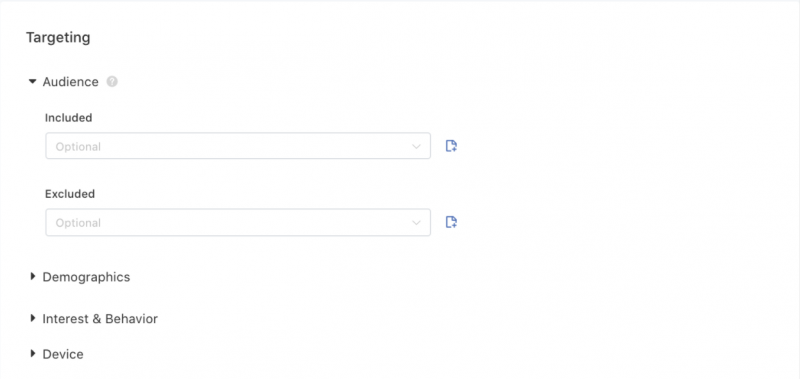
Custom audience targeting on TikTok allows you to target your audiences based on customer data files (a list saved in a CSV, TXT, or ZIP file) and previously engaged audiences. These are the users who have interacted with your ads, or who have seen your ads before (impressions), app activity (e.g., sign up, activate, purchase, etc), and website traffic actions (e.g., view content, button click, purchase, form submission, etc).
Similar to Meta’s custom audiences, TikTok Custom Audiences enable you to target individuals who have interacted with your business. You can create a custom audience from various sources, including website traffic, lead generation, app activity, engagement, and customer files.
The most interesting part is that you can integrate TikTok custom audiences with different tools through LeadsBridge to automate the entire data management process.
d. Set the budget and the schedule
In this section, you need to specify your budget for the ad. There are different options here, as shown below.
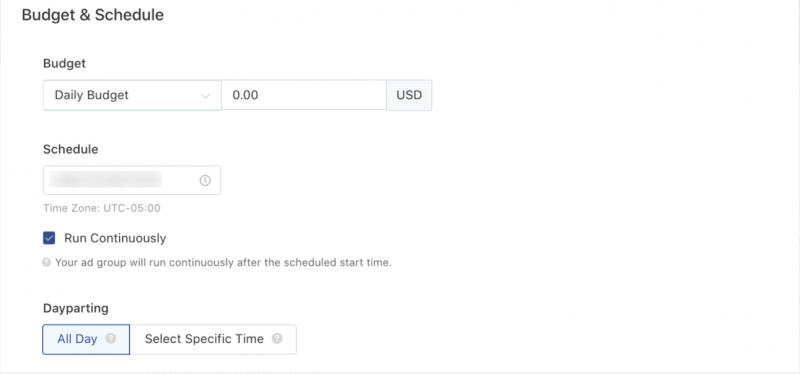
Now, it is time to set a budget for the ad. This can be a daily budget or a lifetime budget. The schedule specifies the start and end times for the ads.
Choose a range of dates to run your ad, or opt to run it continuously for as long as you want. The day-parting option allows you to choose the specific time periods in a day, ranging from half an hour to 24 hours.
e. Set up the bidding and optimization
This is the section where you choose your bidding process and optimization options and add third-party tracking links to help monitor the performance of your ad.
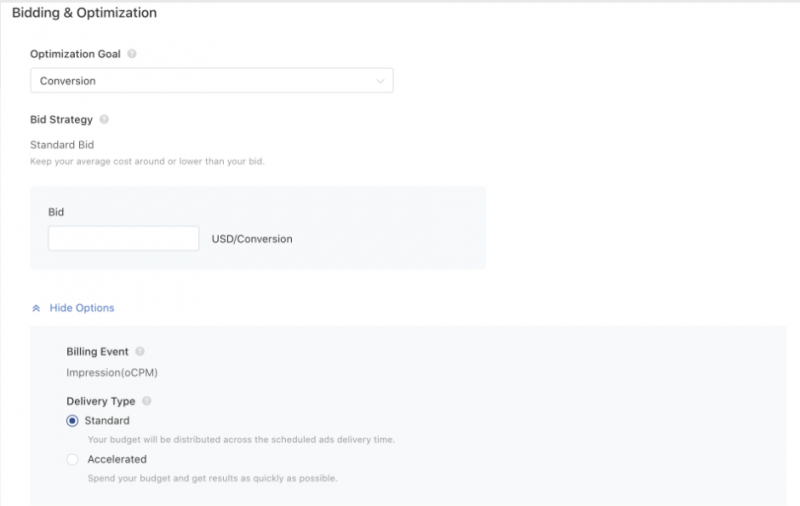
The first option here is the optimization goal. There are three types – conversion, click, and reach. First, choose the goal for your campaign, then configure the billing event option. The TikTok system automatically sets the billing event based on your selected optimization goal.
For example, if you select “reach” as your optimization goal, your ads will be billed as CPM (cost per mille). Here’s a link to more information on bidding methods on the TikTok Ads Manager.
Next comes smart optimization. This option allows you to choose how the system optimizes conversion events and carries out smart delivery. It is recommended that you activate the smart optimization option to help with your conversions.
The bid strategy helps control your cost per result if you put it in the “standard bid” mode. This ensures that the average cost per result is within your bid during the delivery process.
The bidding option helps you set the amount you are ready to pay for a thousand impressions, per click, or per conversion. The TikTok system will deliver the ads as per your bid specification.
The delivery type is available in two formats: standard and accelerated. When you select the standard delivery, your ad budget will be spent evenly during the campaign. The “accelerate delivery” option will spend the budget quickly during the campaign.
You can find more information on the delivery type here.
Now it is time for the exciting part: creating your ad.
3. Creating your ad
Ad creation on TikTok is easy. All you need to do is upload your images or videos and eye-catching design ads in minutes using the features available on the TikTok ad manager. You can create two types of ads on TikTok – image and video ads. TikTok has an ad limit of 20 ads per ad group.
Now, follow the steps below to create your TikTok ad.
a. Start by entering the ad name in the specified column below. This will help you identify your ads.

b. Choose the ad format. TikTok allows you to choose from the two options available – i.e., image or video. But currently, you can only create video ads on TikTok.
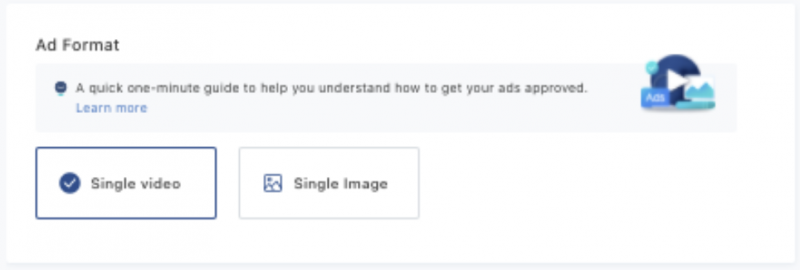
c. Add your ad details by uploading your creative media. You can upload your media from your computer or use the media from your previous ads. You can also choose to create a new video.
To create a new video, select “use video template” or “smart video“. Select the video thumbnail that will serve as a cover photo for your video ad. You can upload a new one or choose from the images from your video.

Include the text and link that will be shown with your ad. This includes the display name, text, call to action, profile image, and the URL of the website you want to drive traffic to if traffic is your main campaign objective. When you are done, preview your ad on your device. This will show you how the video ad will look after publishing it.
d. Add relevant tracking links to your ad.
TikTok allows you to add third-party tracking URLs and pixels to help you track your ad performance. Here is a list of supported third-party measurements and TikTok Pixels.
Click the “submit” button to complete the ad creation process when you are done. This will trigger the ad review process. Once your ad is approved, it will automatically go live.
Selecting TikTok’s objectives for your campaign
TikTok provides a range of campaign objectives to help advertisers achieve their marketing goals on the platform. These objectives are divided into three categories: Awareness, Consideration, and Conversion.
Awareness
The Awareness category includes the Reach objective, which serves video ads to the largest possible audience on TikTok. This objective is ideal for advertisers looking to increase brand awareness and expand their reach on the platform.
Lead generation efforts fall under this category. Once you collect enough data at this stage, you’ll need to process it efficiently.
LeadsBridge automatically sends lead data generated from your TikTok Lead Ad campaigns to your CRM or marketing automation platform. This helps you to follow up with leads on time, which could improve your conversion rate.
Consideration
The Consideration category offers several objectives to help advertisers drive specific actions and engagement from users. The Traffic objective directs more users to a specific landing page, such as a campaign page or a section of the advertiser’s app.
The App Installs objective is designed to encourage users to install the advertiser’s app on their mobile devices, while the Video Views objective helps to increase engagement with the advertiser’s video content.
Conversion
The Conversion category is focused on driving specific user actions on the advertiser’s website, such as page views or online sales. The Conversion objective helps advertisers to optimize their campaigns toward achieving these specific goals.
With LeadsBridge, you can connect your CRM or marketing platform with TikTok Conversions to track your segmented audiences and monitor conversions for a full-funnel measurement.
Select the campaign objective that best aligns with your business goals. The success of a TikTok ad campaign depends on selecting the appropriate objective and optimizing the ad campaign accordingly.
TikTok campaign objectives vs. TikTok advertising objectives
ikTok’s advertising objectives and campaign objectives are both important components of a successful TikTok ad campaign. While the two terms are sometimes used interchangeably, they have different meanings and functions.
Advertising objectives are the specific marketing goals that advertisers want to achieve, while campaign objectives are the broader settings and parameters of the TikTok ad campaign that help to achieve those goals.
Aligning these two objectives can help you maximize your impact on TikTok and achieve your desired results. Here are some instances of TikTok advertising objectives:
- Branding focuses on increasing brand recognition and reaching a wider audience.
- Traffic is used to send users to a specific website or landing page, ideal for promotions or new content.
- App Installs helps drive mobile app downloads directly from TikTok.
- Video Views aims to boost visibility by getting more eyes on your video content.
- Lead Generation lets you collect user info like emails or phone numbers for future marketing, such as newsletters or downloads.
TikTok ad targeting
TikTok ad targeting dimensions are various parameters or criteria that advertisers can use to target their ads to specific audiences on the TikTok platform. Here are some common TikTok ad targeting dimensions:
- Demographics: Age, gender, location, language, education level, and income.
- Interests and behaviors: Hobbies, topics, industry interests, past ad or content interactions.
- Device and connection type: Device model, operating system, Wi-Fi, or mobile data usage.
- Custom audiences: Use your own data (e.g., email lists, website visitors) to retarget users.
Lookalike audiences: Reach new users who share traits with your existing audience.
Audience targeting is crucial when running TikTok ads for several reasons:
- Targeting ensures ads reach people most likely to be interested, boosting engagement and conversions.
- Showing ads to the right audience minimizes waste and improves ROI.
- Relevant targeting leads to higher CTRs, conversions, and overall campaign success.
- Tailored messaging enhances ad impact and creates a better user experience.
How to optimize TikTok ads
Here are some tips for optimizing TikTok ads from a technical perspective:
- Choose the right format: Match your ad to the most suitable TikTok format and follow its technical guidelines.
- Optimize video quality: Use high-resolution visuals, good lighting, and clear audio to meet TikTok’s visual standards.
Keep it short: Stick to 15–30 seconds, as shorter videos typically perform better on the platform. - Follow ad specs: Ensure correct resolution, aspect ratio, and file size to avoid delivery issues.
- Test and refine: Monitor performance metrics and adjust creatives or settings for better results over time.
TikTok ad policy
TikTok’s ad policy sets clear rules to ensure ads are safe, relevant, and aligned with community standards. It covers ad formats, creative specs, and targeting practices, while strictly prohibiting content related to misinformation, tobacco, firearms, and political messaging.
Advertisers must follow guidelines for features like text-to-speech and interactive elements to maintain a user-friendly experience. TikTok also enforces strict standards regarding targeting, including demographic, interest-based, and geographic criteria. Staying compliant protects your brand while also improving ad approval rates and campaign performance.
Here are some of the important highlights of the TikTok ad policy for marketers.
Use the right ad format
Ads must clearly reflect what’s being promoted. Landing pages should match the ad’s content and be fully functional with no broken links or bait-and-switch tactics.
All messaging, visuals, and language must be relevant, accurate, and appropriate for the target audience.
TikTok Ad Specs
- Aspect Ratio: 9:16 (preferred), 1:1, or 16:9
- Resolution: Minimum 720 × 1280 px recommended
- Formats: .mp4, .mov, .mpeg, .3gp, .avi
- Video Duration: 5–60 seconds (21–34 seconds performs best)
- Max File Size: 500 MB
- Profile Image: Square, under 50 KB
- Brand/App Name: 2–20 characters (brands), 4–40 (apps)
- Ad Description: Up to 100 characters, no emojis
Spark Ads Specs
- Flexible on aspect ratio, resolution, and length
- File size not restricted
- Original post display name, text, emojis, and mentions are allowed
Note that Character limits differ by language; Asian characters often count as double.can create high-quality video ads that are optimized for TikTok’s unique platform and audience.
TikTok ads best practices
TikTok ads best practices are time-tested methods to help advertisers create effective and engaging ads that resonate with the platform’s audience.
Take a look at these best practices for creating TikTok ads:
- Keep it short: Aim for 21–34 seconds for best performance.
- Be creative: Use authentic, eye-catching content that fits TikTok’s style.
- Add music: Use trending tracks to boost attention and emotional impact.
- Design for sound-off: Include captions or visuals to get your message across.
- Use trending hashtags: Check the Discover page for popular tags to boost reach.
- Create FOMO: Limited-time offers or low stock messaging drives quick action.
- Target smart: Use TikTok’s targeting tools to reach your ideal audience.
- Test and tweak: Try different creatives and formats, then optimize using TikTok’s analytics.
- Partner with creators: Work with influencers to promote your product through native-style videos.
If you are in the midst of TikTok ad strategy optimization, you might find these helpful:
- The latest social media trends to see what people want to see
- Top TikTok content ideas for your campaigns
Creative Tips at TikTok Ads Creative Center
TikTok Ads Creative Center offers a great wealth of guidance and inspiration. This tool – also known as TikTok Ads Library – is a free resource available to anyone with a TikTok Business Account.
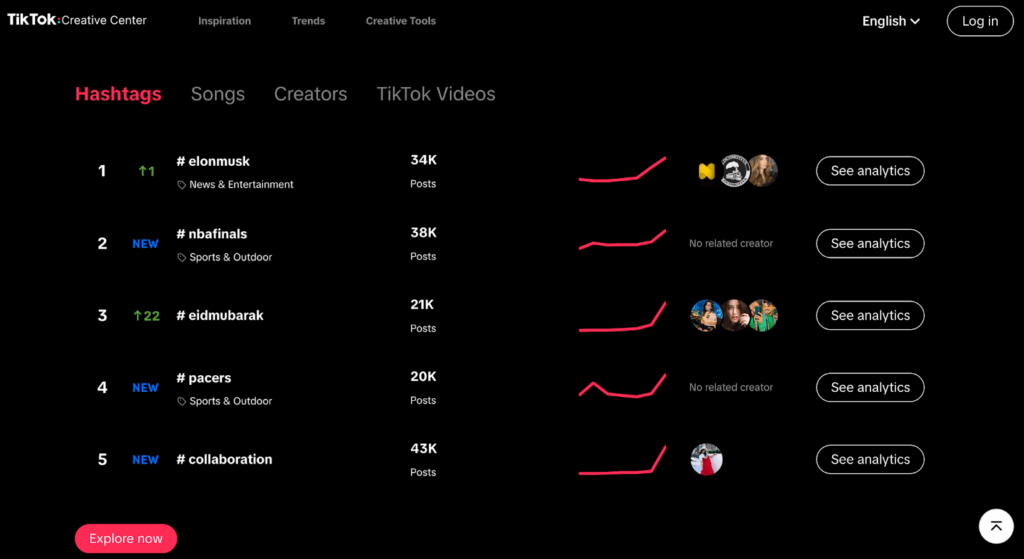
It’s incredibly useful because it provides users with:
- The best practices on how to create the best-performing TikTok ads.
- Detailed insights on the latest TikTok trends across all industries.
With the TikTok Ads Creative Center, you can explore the Trend Discovery page to see what top-performing ads look like in your industry.
Filter by campaign objective to find examples that match your goals, then study what’s working and apply those insights to your own tests and creative strategy.
TikTok Lead Generation
Similar to Facebook lead ads, TikTok Lead Generation helps businesses share the details of their product or services with interested users.
Brands can use the TikTok Lead Generation to reach and engage with their prospects and customers and collect their data directly on in-stream ads on TikTok. You have a higher chance of conversions if your profile has likes and a high number of views.
This feature uses a pre-filled form with the user’s name, email, phone number, and other requested details. This makes it easy for users to submit, consequently reducing friction and boosting lead conversion rates.
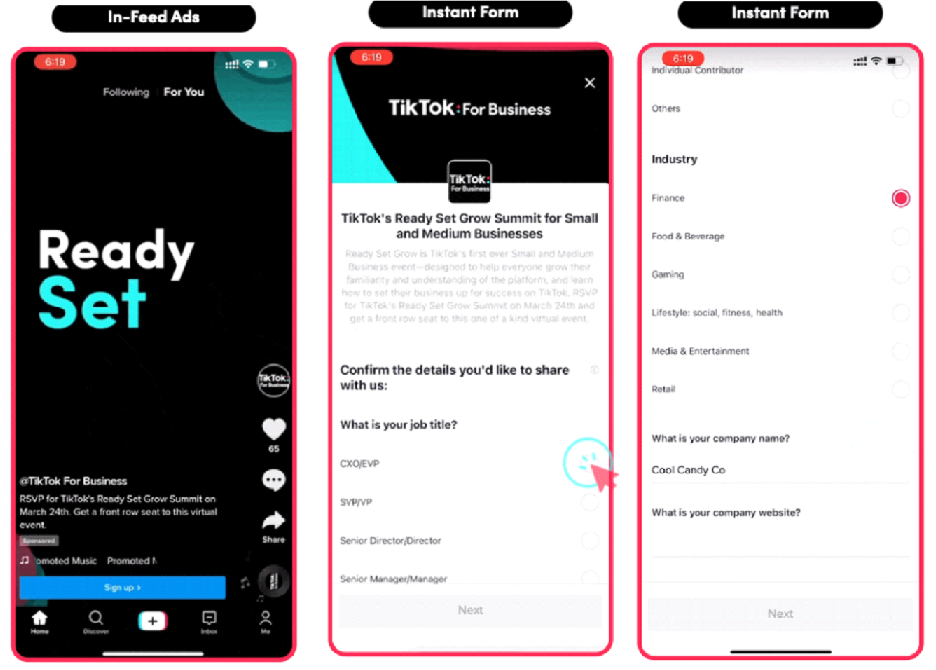
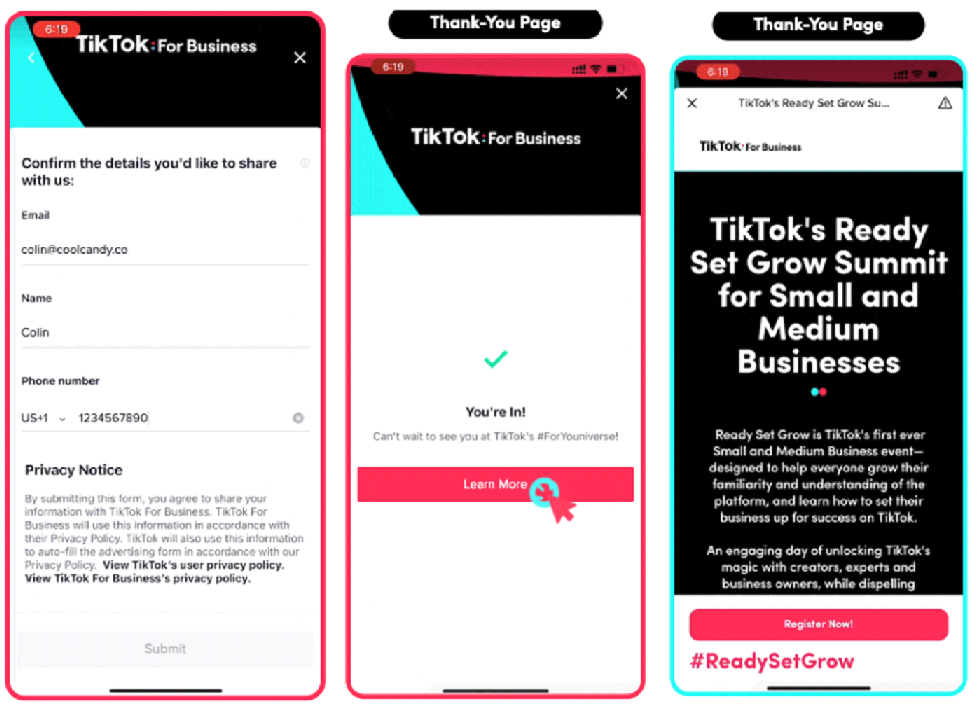
TikTok Lead Generation forms are built for mobile and keep users on the platform. The form includes a customizable background image (great for branding), your profile image, and a question section you can tailor to collect the info you need.
As an official TikTok partner, LeadsBridge offers integrations with TikTok Lead Generation that facilitate seamless and automated data management.
Automated data bridges help connect your TikTok lead ads with your favorite tools, such as Salesforce®, Google Sheets, Klaviyo, etc.
Another great feature is TikTok Custom Audiences, which was designed to perform as a TikTok targeting option. In a nutshell, it enables you to connect with individuals who have previously engaged with your content or are familiar with your brand beyond TikTok.
You can do this by using:
- Interest Targeting: Reaches users based on their personal interests and the content or brands they engage with.
- Behavioral Targeting: Targets users based on how they interact with your brand over time.
- Retargeting: Re-engages users who have already interacted with your content or ads.
- Demographic Targeting: Targets audiences by age, gender, location, language, and other characteristics.
You can upgrade your TikTok advertising by integrating TikTok Custom Audience with your favorite marketing tool.
TikTok advertising cost
There is no official advertising pricing on TikTok. However, Ad Age provided some insight into TikTok’s advertising cost. To ensure your ad delivery is continuous, you need to set a minimum budget for both types (lifetime and daily).
Want an in-depth look at TikTok advertising costs? Read this article to find out.
What is a good CPM for TikTok ads?
As of 2025, an average CPM (cost per thousand impressions) on TikTok typically falls around $3.20–$10. TikTok still offers one of the most competitive CPM rates among major platforms.
However, a low CPM may also reflect lower click-through or engagement rates, so it’s essential to evaluate CPM alongside performance metrics such as CTR and conversions.
What is a good CTR for TikTok ads?
A click-through rate (CTR) measures the effectiveness of an ad campaign. The typical CTR on TikTok depends on its type:
- TopView ads achieve 12–16%, thanks to their full-screen launch placement.
- Brand Takeovers typically get 7–10% CTR.
- In-Feed ads yield 1.5–3% CTR, blending into the regular feed..
The TikTok platform’s scroll-first design has become a double-edged sword for advertisers. It can translate into a higher rate of impressions and a lower rate of click-throughs comparatively.
TikTok advertising revenue
TikTok’s expanding user base makes it one of the most efficient platforms for reaching global, mobile-first audiences. Social commerce integrations are making it easier than ever to drive direct sales within the app environment.
- Strong revenue growth: TikTok’s global ad revenue is projected to surge from $23.6 billion in 2024 to $33.1 billion in 2025, marking a 40% increase.
- Dominating the social video market: By 2026, TikTok and Douyin are expected to capture nearly 11% of global social ad spend, outpacing the annual growth of platforms like Facebook and Instagram
- Long-term potential: TikTok’s annual ad revenue is expected to climb to roughly $54 billion by 2027.
- Strong US performance (despite regulatory issues): US ad revenue is projected at about $9.5 billion in 2025, even as US regulators consider stricter scrutiny.
Stay updated with the current news about the TikTok ban in the US here.
How to get ad revenue on TikTok
If you’re interested in how to get ad revenue on TikTok, you can follow these strategies:
- Create authentic content: TikTok encourages brands to make ads that blend seamlessly with regular content. Authentic, engaging videos that resonate with the audience tend to perform better than traditional ads.
- Leverage hashtags and trends: Participating in popular hashtags like #TikTokMadeMeBuyIt can increase engagement and visibility. Aligning content with trending topics helps attract more viewers.
- Use TikTok Ads Manager: Use TikTok’s Ads Manager to create targeted ad campaigns. The platform offers various ad formats, like we mentioned above, which can be tailored to reach specific audiences.
- Collaborate with influencers: Partnering with TikTok influencers can amplify your reach. Influencers with large followings can help promote products organically, leading to higher engagement rates.
- Focus on short-form content: TikTok is known for its short-form videos. Creating concise and visually appealing content that quickly captures attention can lead to better ad performance.
How to track TikTok campaigns
TikTok Ads Manager offers a comprehensive dashboard where you can monitor ad performance, spend, and delivery status across campaigns, ad groups, and individual ads.
You can track key metrics like CPM, CPC, CPA, CTR, and conversions, and filter results by audience data such as gender, device type, and time of day. These insights help you fine-tune campaigns in real time for better results.
TikTok also offers customizable report templates that make it easy to build detailed performance reports. You can download them on demand or schedule automatic delivery. It can be daily, weekly, or monthly.
To access the data, navigate to the Campaign page, select the campaign, ad group, or use ad tags, and then click “View Data” to view performance metrics and audience insights.
TikTok Advertising examples
1. Sandro
SANDRO used TikTok’s Smart+ Catalog to automate holiday campaigns, doubling ROAS, increasing conversions by 43%, and cutting session costs by 71%.
This ad shows how an automated, full-funnel setup can drive strong performance with minimal manual effort.
2. Nivea Luminous 630
Nivea Luminous 630 used TikTok’s Branded Mission and TopView to drive +6.3% brand awareness, 1.3M interactions, and 500+ UGC videos.
Collaborating with creators Burrita Burrona and Turbulence, the campaign built cultural relevance, humor, and strong community engagement around skincare.
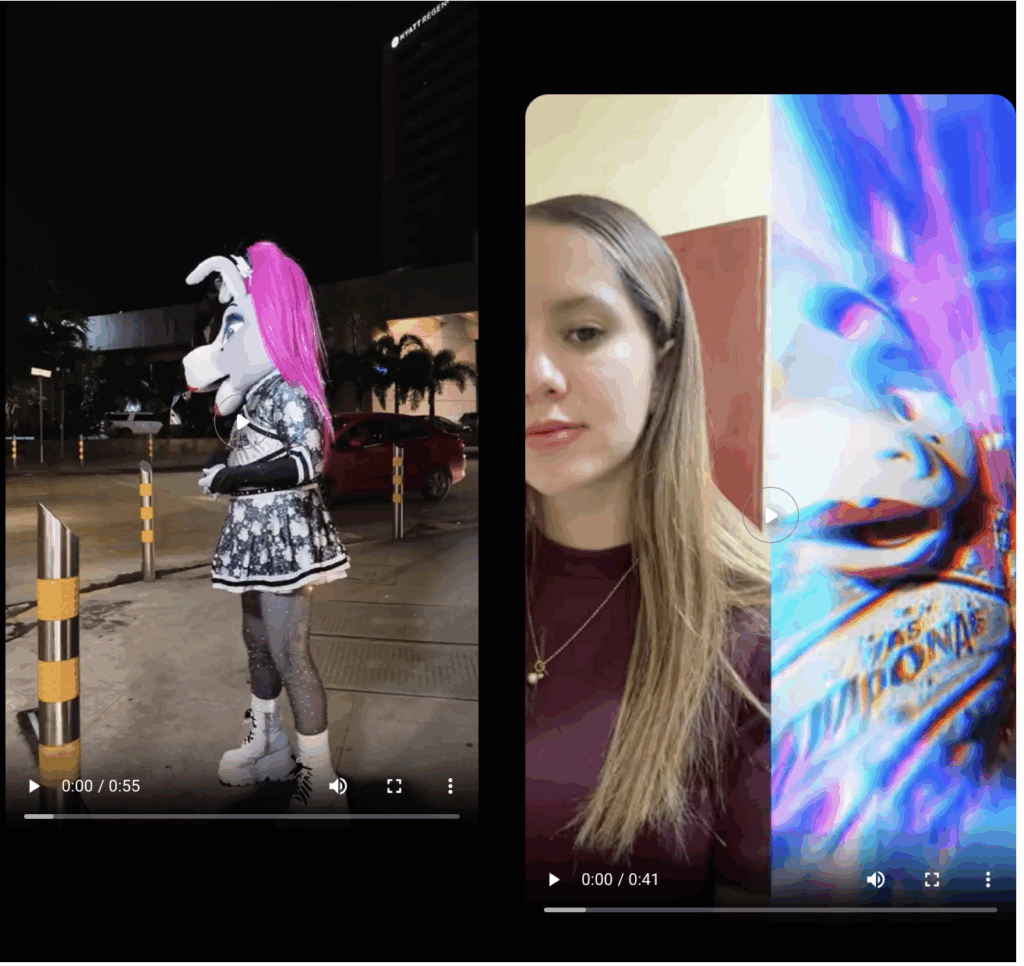
3. Opendoor
Opendoor used TikTok Search Campaigns to reach high-intent home sellers, achieving a 50% lower CPA, 539% higher CTR, and 66% lower cost per result.
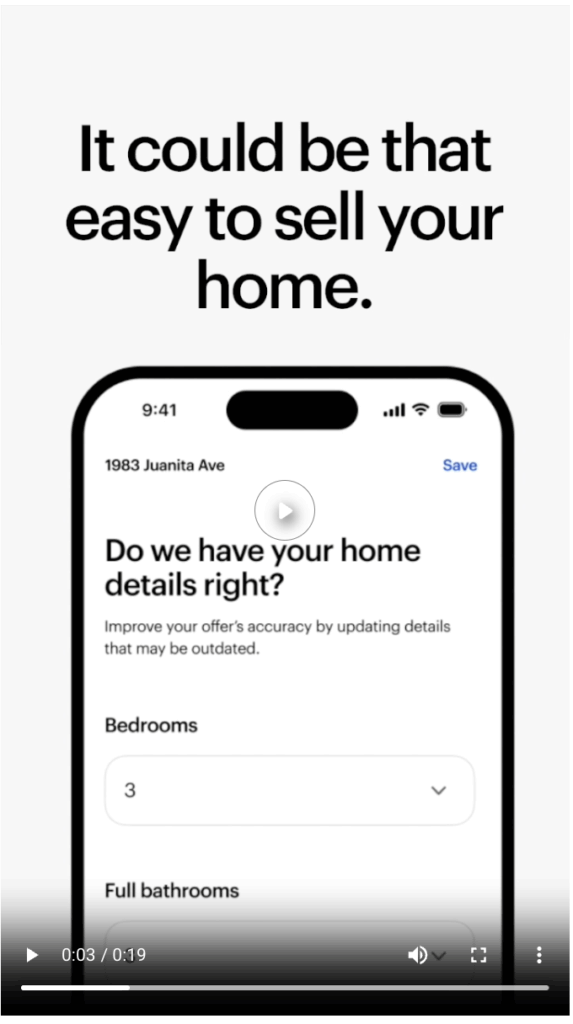
By combining Automated Keywords with relevant video and image creatives, they drove efficient acquisition in a high-consideration category like real estate.
Check out a full list of TikTok ad examples now.
TikTok ads vs. Facebook ads
TikTok and Facebook remain top choices for digital advertisers, but they serve different strengths. TikTok excels in short-form, sound-on, highly visual content, ideal for engaging younger audiences through trends and creator partnerships.
Facebook still leads in detailed targeting, diverse ad formats, and full-funnel marketing across both Facebook and Instagram.
The right platform depends on your campaign goals, creative style, and target demographic.
| Feature | TikTok ads | Facebook ads (Meta) |
| Content Style | Short-form, video-first, music-driven | Mixed content (video, image, carousel) |
| Best For | Engagement, virality, younger audiences | Targeting depth, lead gen, retargeting |
| User Base | 2B+ MAUs, mostly Gen Z & Millennials | 3B+ MAUs, broader age range |
| Ad Formats | In-Feed, TopView, Spark ads, Branded effects | Video, Image, Carousel, Instant Experience |
| Creative Approach | Trend-driven, native-feel, UGC-style | Structured, CTA-driven, varied formats |
| Targeting | Interest, behavior, lookalikes | Demographics, behaviors, custom audiences |
| Analytics | TikTok Ads Manager, real-time trends | Meta Ads Manager, detailed reporting |
| Average CPM | ~$3–10 (2025) | ~$8–14 (2025) |
| Average CTR | ~0.7–1.5% (higher for TopView) | ~0.9–2% depending on format |
Learn all about TikTok ads vs. Facebook ads here.
TikTok ads vs. Instagram ads
TikTok and Instagram are both powerful visual platforms, but they serve slightly different purposes. TikTok is centered on short-form, trend-driven video, while Instagram offers a broader mix, including images, videos, Stories, and Reels.
Instagram ads also stand out due to their advanced targeting and a more established ad ecosystem.
Your platform choice should reflect your audience’s behavior, age range, and the type of creative your brand can produce consistently.
| Feature | TikTok ads | Instagram ads |
| Content Style | Short-form, full-screen video | Photos, Stories, Reels, carousels |
| Best For | Virality, Gen Z engagement | Brand polish, broad reach, retargeting |
| User Base | 2B+ MAUs, mostly Gen Z | 2.5B+ MAUs, strong Millennial and Gen Z mix |
| Ad Formats | In-Feed, Spark Ads, TopView, Branded Effects | Feed ads, Reels, Stories, Carousels |
| Engagement Rate | Higher (especially for UGC + creators) | Moderate, varies by format |
| Targeting | Interest, behavior, lookalikes | Advanced: interest, behavior, retargeting |
| Analytics | TikTok Ads Manager | Meta Ads Manager (Instagram via Facebook) |
| Average CPM | ~$3–10 (2025) | ~$7–12 (2025) |
| Average CTR | ~0.7–1.5% | ~0.9–2% |
Here are some of our popular Instagram integrations:.
TikTok ads vs. Google ads
TikTok ads are ideal for engaging younger audiences (Gen Z and Millennials) through visually creative videos. The platform excels at building brand awareness and relevance.
Google advertising is built for intent-based marketing. Whether users are searching for products, browsing websites, or watching YouTube videos, Google lets you target based on real-time demand. It’s highly effective for direct conversions, lead gen, and lower-funnel campaigns.
The strongest strategies in 2025 often combine both platforms: TikTok for discovery, Google for intent.
| Feature | TikTok ads | Google ads |
| Primary Strength | Engagement, awareness, and cultural relevance | Intent-driven targeting, conversions |
| Best For | Gen Z & Millennials, viral reach | High-intent users ready to act |
| Content Style | Short-form, creator-led, trend-driven | Text search, display banners, product listings, video |
| Ad Formats | In-Feed, TopView, Spark, Hashtag Challenges | Search, Display, Shopping, YouTube (Video) |
| Audience Targeting | Interest, behavior, lookalikes | Keyword, demographic, remarketing, custom intent |
| Engagement Style | Scroll-based discovery, entertainment-first | Action-based search, direct navigation |
| Average CPC (2025) | ~$0.50–$2.00 | Varies widely (~$1–$10+ depending on competition) |
| Conversion Strength | Low to mid-funnel | Mid to bottom-funnel |
Check out these integrations that help you leverage your Google lead generation:
TikTok ads vs. YouTube ads
TikTok is built for trend-driven content with a strong emphasis on creativity and viral potential. It’s ideal for brands aiming to drive cultural relevance.
YouTube supports both short- and long-form content, with deeper viewer intent and longer attention spans. It’s better suited for storytelling, education, product demos, and brand building across age groups.
The choice very much depends on how you want your message consumed.
| Feature | TikTok ads | YouTube ads |
| Content Style | Short-form, vertical, sound-on | Short- and long-form, horizontal or vertical |
| User Intent | Discovery, entertainment | Active watching, intentional search |
| Top Ad Formats | In-Feed, Spark ads, TopView, Branded Challenges | Skippable/Non-skippable Video, Bumper, Shorts |
| Best For | Awareness, engagement, trend participation | Education, deep storytelling, high-retention ads |
| User Base (2025) | 2B+ MAUs, Gen Z & Millennials | 2.7B+ MAUs, across all age groups |
| Engagement Style | Fast, scroll-based, community-driven | Longer view sessions, more deliberate attention |
| Targeting Options | Interests, behaviors, lookalikes | Keywords, demographics, in-market, custom intent |
| Avg CPM (2025) | ~$3–10 | ~$5–15 |
| Avg CTR (2025) | ~0.7–1.5% | ~1–2.5% |
Snapchat ads vs. TikTok ads
Both Snapchat and TikTok are strong platforms for reaching Gen Z and younger millennials, but they serve slightly different roles in a marketing strategy.
TikTok is centered around short-form, full-screen video and thrives on cultural trends, viral content, and creator collaborations. Snapchat, meanwhile, focuses on private sharing and immersive ad formats like AR Lenses, Filters, and Stories.
You should take your pick based on audience behavior, creative style, and the level of immersion or trend-driven nature required for the campaign.
| Feature | TikTok ads | Snapchat ads |
| Content Focus | Short-form, trend-based video | Private, immersive, and AR-driven content |
| User Base (2025) | 2B+ MAUs, mostly Gen Z & young millennials | 750M+ MAUs, strong among ages 18–34 |
| Top Ad Formats | In-Feed, TopView, Spark ads, Hashtag Challenges | Snap Ads, Story Ads, Lenses, Filters, Collection Ads |
| Creative Strength | Viral, sound-on, creator-driven content | AR, sequential storytelling, interactive formats |
| Targeting Options | Interests, behaviors, lookalikes, retargeting | Demographics, behaviors, custom audiences |
| Engagement Style | Public, trend-based discovery | Direct, 1:1 or group-based interaction |
| Best Use Case | Brand awareness, cultural engagement, UGC | Product try-ons, location-based or AR campaigns |
| Avg CPM (2025) | ~$3–10 | ~$3–8 |
| Avg CTR (2025) | ~0.7–1.5% | ~0.6–1.2% |
TikTok vs. Pinterest ads
TikTok thrives on short-form, entertainment-driven content, making it an ideal platform for brands seeking to boost awareness and engagement.
Pinterest, on the other hand, is intent-focused used for planning and inspiration. It’s a strong platform for brands targeting users actively looking to discover and buy.
Choosing between them depends on your campaign goals: TikTok is best for cultural impact and virality, while Pinterest excels at influencing purchase decisions and long-term planning.
| Feature | TikTok ads | Pinterest ads |
| Content Focus | Entertainment, trends, short-form video | Inspiration, planning, and evergreen content |
| User Intent | Passive browsing, entertainment | Active searching, high purchase intent |
| Top Ad Formats | In-Feed, Spark Ads, TopView, Hashtag Challenges | Promoted Pins, Idea Ads, Shopping, Carousel |
| User Demographic | Mostly Gen Z & Millennials | Broad age range, strong female audience |
| Engagement Style | Trend-driven, creator-led, fast-paced | Visual discovery, slower-paced, save-first |
| Best For | Awareness, engagement, UGC | Product discovery, planning, and purchase intent |
| Targeting Options | Interest, behavior, lookalikes | Keywords, interests, custom, act-alike audiences |
| Avg CPM (2025) | ~$3–10 | ~$2–5 |
| Avg CTR (2025) | ~0.7–1.5% | ~0.9–2.2% |
Here are some helpful resources to help you learn more about Pinterest ads:
Takeaways
TikTok is a leading ad platform for brands targeting global, mobile-first, and younger audiences. Its high engagement and mobile-optimized lead generation tools allow marketers to collect user data directly through in-stream ads.
For best results, your incoming leads should be synced for further nurturing via automated integrations.
Discover our TikTok Lead Generation integrations and join the TikTok Custom Audience waiting list to take full advantage of your TikTok advertising campaigns.




